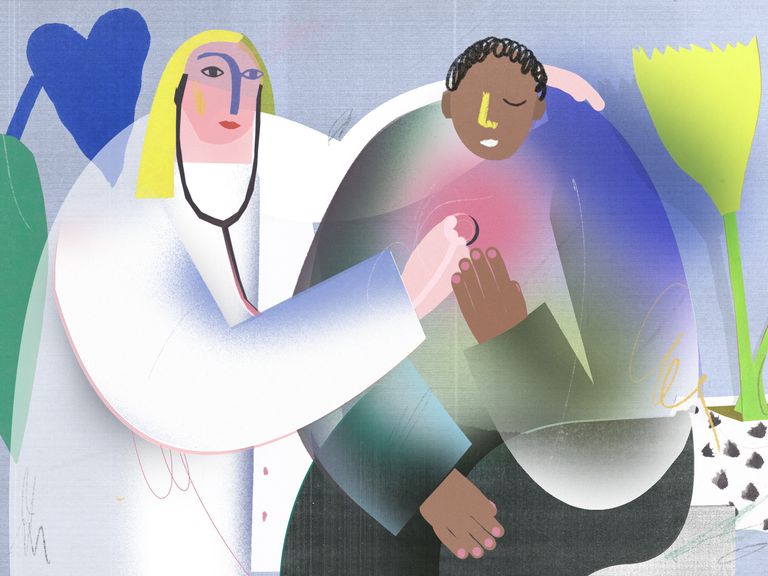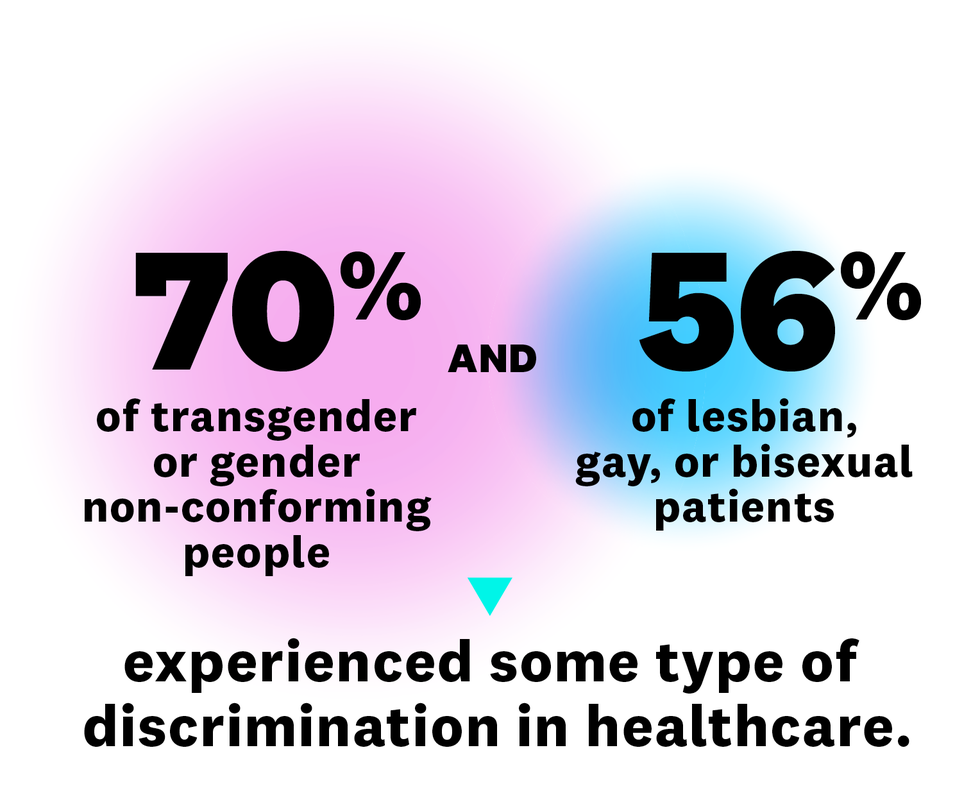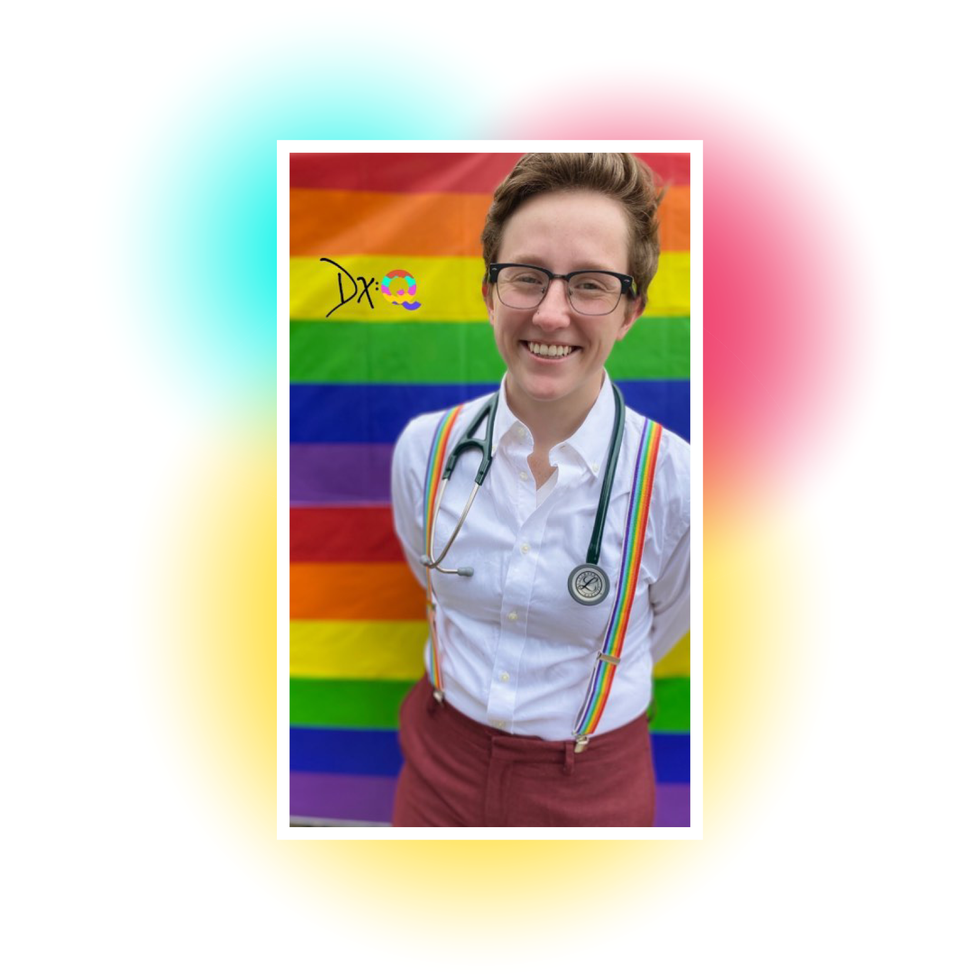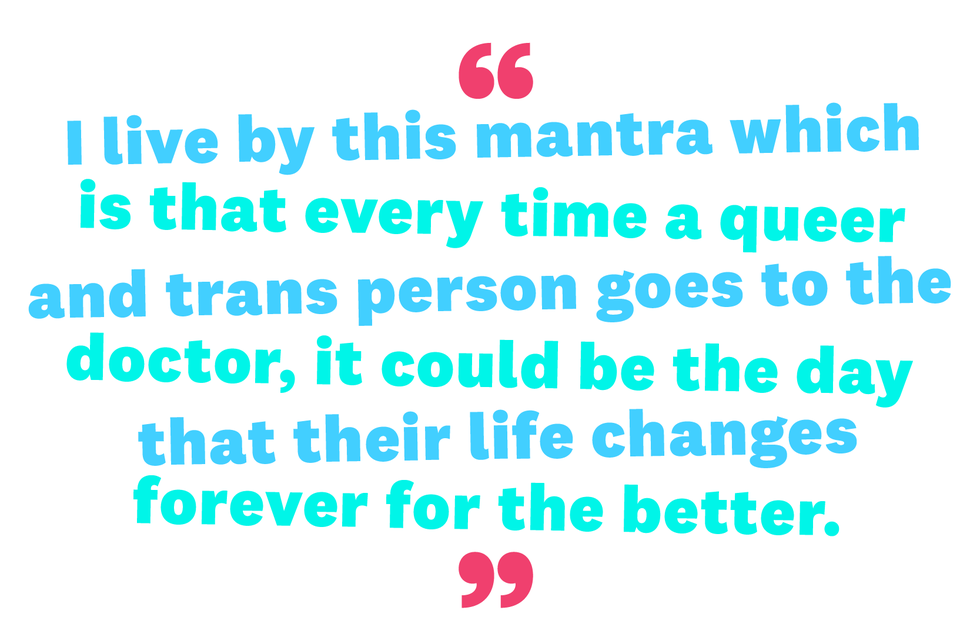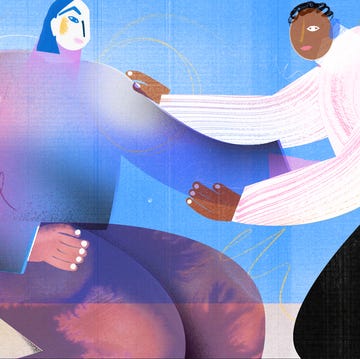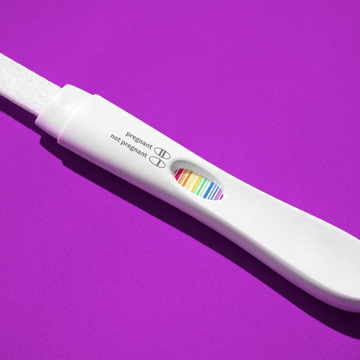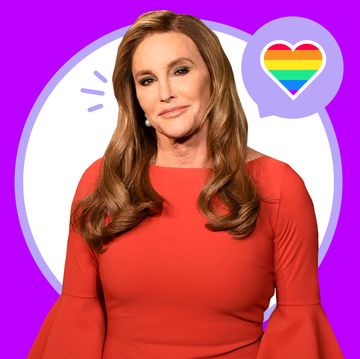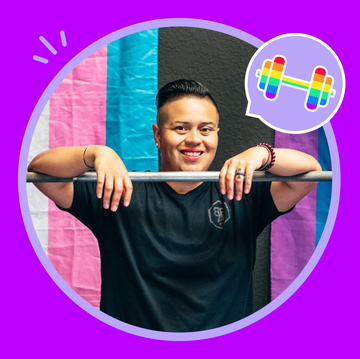In March, Sylvana M. went on TikTok to share a negative experience she had at a doctor’s office while back in her hometown in the Caribbean.
Sylvana, 22, who is attending college in Philadelphia, went to her gynecologist to get some general information on how to care for her sexual health as a gay person.
She was nervous. She wasn’t sure how her doctor would react to hearing her say she was gay.
Things didn’t go well. The doctor asked if she had a boyfriend. Sylvana responded, "Nope, I won't ever have a boyfriend."
Surprised, the doctor asked her what she meant by that. Sylvana responded, "Well, I'm not interested in men," Then, Sylvana says the conversation took a turn. "That's when she went to, 'Oh, you're probably confused. You're in college, so you're most likely experimenting.'"
The doctor then asked what kind of women she was attracted to, further suggesting that her identity was "confusion."
“If you are attracted to masculine women, then you are most likely straight. If you’re attracted to feminine women, then you’re most likely bi, but highly likely that you’re just confused and are straight,” Sylvana recalls the doctor saying.
She wanted to bolt. Sylvana was so uncomfortable that she started agreeing with whatever the doctor was saying just to get out of the room. “You're in a vulnerable place already when you're at the gynecologist's office," she says. "I just wanted to get it over with and leave and not have to continue that conversation.”
Sylvana left without the information about sexual health that she was seeking. Instead, she felt invalidated.
Sylvana is just one of many LGBTQ people who don't feel comfortable or even welcome in a medical setting, and the health implications of that are staggering. Around 70 percent of transgender or gender non-conforming people and 56 percent of lesbian, gay, or bisexual patients say they’ve experienced some type of discrimination in healthcare, found a survey by the Healthcare Equality Index. And that all-too-common discrimination could lead to LGBTQ people avoiding medical offices altogether.
Devastating Health Consequences
In a 2017 survey by the Center for American Progress, the organization found that LGBTQ people were more likely to postpone both preventative and needed medical care to avoid experiencing discrimination. Nearly 24 percent of transgender respondents and 4.4 percent of cisgender lesbian, gay, and bisexual respondents also reported avoiding doctors’ offices that year. And those numbers increase for people of color: 10.3 percent of all respondents of color said they skipped all visits to a physician's office.
The discomfort LGBTQ people face in medical offices isn’t only frustrating in real-time. It also has catastrophic long-term consequences. LGBTQ people are often at significantly higher risks of both physical and emotional conditions compared to heterosexual and cisgender individuals. As many as 30 percent of LGBTQ youth specifically experience mental health conditions, like depression and anxiety. They also have higher instances of suicide attempts and PTSD, finds a study in the American Journal of Public Health.
According to the American Heart Association, LGBTQ adults are at a higher risk for cardiovascular disease compared to cisgender heterosexual adults, likely due to unique stressors, including healthcare discrimination. They also have a heightened risk for substance abuse, according to the journal LGBT Health. And those are just a few of the disparities.
Built-In Barriers To Care
Katie Peterson, who is studying to be a doctor and is gay, says that often, the language used during a doctor’s visit isn’t LGBTQ+ friendly.
She can’t even count the number of times doctors have questioned how she could be "so sure" that she isn’t pregnant. “There’s just this expectation that everyone is straight and women sleep with men and men sleep with women," Katie says. "It’s not a comfortable or safe-feeling space."
Jessica Halem, who serves on the board of the Tegan and Sara Foundation, an organization advocating for the health, economic justice, and representation of LGBTQ girls and women, says that the anxiety LGBTQ people experience when trying to access medical care begins even before they even walk into a provider’s office. For many, it can be tough to even get health insurance coverage. In the United States, sexual minority women and men are twice as likely to be uninsured than their heterosexual counterparts, according to a study published in the British Medical Journal.
As a physician-to-be, Katie knows the importance of annual screenings. But at one point, she went without a primary care doctor for eight years. "It wasn't worth feeling uncomfortable to go through the lottery of hoping I find a doctor that I like," she says.
Creating A New Path Forward
Jasmyne Jackson, a second-year pediatric resident at Boston Children's Hospital and Boston Medical Center, says that the answer isn’t solely identifying more doctors that are LGBTQ-friendly. Everyone, regardless of their sexual identity or gender expression, can play a role in making the healthcare space more inclusive. “It really is a holistic approach to both medical training, the hospital environment, as well as larger policy forces within the healthcare system,” she says. That means addressing everything from the training doctors receive in medical school to improving access to insurance.
Still, the health and safety of the LGBTQ community can’t wait, and sometimes 15 minutes in a doctor’s office could be life-changing, says Halem. “I live by this mantra which is that every time a queer and trans person goes to the doctor, it could be the day that their life changes forever for the better. That one visit could be the time that they finally get on PrEP [a daily pill that reduces the risk of infection before a possible HIV exposure] and talk about HIV, that they finally talk about gender and get on hormones, that they finally talk about their blood pressure and they're going to get it under control.”
What To Do Before Heading Into The Doctor’s Office
You can’t fix the system alone. "It is the system's job to change and adjust," says Jackson. "People go into healthcare to heal, and so we need to start healing and stop hurting those in the LGBTQ community.” But there are some ways to increase the chance that a visit to the doctor’s office will help rather than harm and minimize your discomfort.
Verify that the doctor knows how to care for LGBTQ+ communities.
Unfortunately, there isn’t an official list of doctors that identify themselves as LGBTQ-friendly, but the GLMA, Health Professionals Advancing LGBTQ Equality, provides a database where you can search for LGBTQ-friendly doctors by location. The CDC’s website also has a similar list.
Another option is calling the medical office you’ll be visiting, says Halem. “Say, ‘Hey, I identify as a bisexual woman. I need to see a doctor that I could be open and honest with about my sexuality.'"
If you prefer a less direct approach, Halem says you can also search the medical facility’s website for doctor bios, look through reviews on Google, or ask for recommendations from friends or other LGBTQ people on social media.
If you're interested in specific coverage, contact your insurance provider.
For help trying to navigate your insurance, reach out to your provider with specific questions about treatment or coverage you're interested in. You can usually find the number on the back of your insurance card.
Ask for someone who understands how coverage works for the treatment or procedure you're interested in. You can say something like, "I am a transgender person looking to have surgical coverage and I want someone to help me understand what my benefits cover and how to use them," Halem suggests.
You can also ask questions about how much you're expected to come out of pocket for that treatment or procedure, where to find an in-network provider, or any other questions you might have.
How To Advocate For Yourself At The Doctor’s Office
Establish a pre-care routine.
To make sure they’re prepared for you, Halem suggests calling the healthcare provider's office to make sure that your pronouns and legal name are on record. Post-COVID, it may also be helpful to bring a friend with you who can make you feel more at ease. “They can help you keep your blood pressure down, keep you laughing, and keep you company in the waiting room,” says Halem.
If your doctor’s using language that doesn’t apply to you, correct them.
Your doctor will ask general questions that will help them learn more about your medical history in order to provide better care. Unfortunately, sometimes these questions are asked with the assumption that the patient is cisgender or heterosexual. If this is happening during your visit, Jackson said it’s totally okay to correct them. She recommends saying something like, ‘Hey my pronouns are this and this, or my partner is blank, or I identify as blank.”
You shouldn't be afraid to tell your doctor if you're feeling uncomfortable. "Our job is to keep the lines of communication open," Jackson says. "If I upset a patient, I want to be able to address that in a way that puts their feelings above mine. Because at the end of the day, my job is to serve my patients.”
But you don’t have to be anyone’s teacher.
If your provider doesn’t have much experience treating LGBTQ people, they may start asking unnecessary questions that don't relate to the health concern at hand, like how long you've been a lesbian or what your current hormone levels are. Halem says the best thing you can do is call it out diplomatically by saying something like, "I appreciate your interest in learning more about my identity, but I’m really concerned about the X, Y, Z issue that brings me in today. Can we shift our focus to that?"
You can go an extra step and follow up that statement with something like, "Maybe later I can send you some links or you can do some research after I’ve left." You don't have to, but it may be worthwhile preserving a positive relationship with your provider if you don't have a lot of choices about who you can see for certain types of coverage in your area.
Ask for help from a patient liaison.
Another option for navigating your visit is finding an advocate before or during your appointment, says Jackson. If you’re in a hospital or a larger medical facility, there should be a patient relations office that can help you find someone that will advocate on your behalf. The advocates can talk to your doctor about something you're uncomfortable about, help you weigh your options, or assist you in understanding your insurance coverage. Having that extra support in your corner can make it easier and more likely that you will get your needs met.
If you’re uncomfortable and it isn’t an emergency, you can leave.
Check in with yourself to determine what feels right for you at that moment. “If you are not in the middle of a health crisis, then get up and leave," Halem says. "I'm tired of my people getting traumatized or re-traumatized in the places that should be safe and supportive, where it might take years to recover from that bad experience.”
But if you are in an emergency situation, try to push through to get what you need. See if a patient advocate is on-call so they can come in and assist you. “Demand that you get the care that you deserve,” says Jackson.
Luckily, there are people trying to change the medical space for the better, like Katie. When she becomes a doctor, she'd like to work in acute care, specifically with children. "I see myself as being this open person they can talk to, and that expands beyond just queerness and medicine," Katie says. "If I can just make it so just one person doesn't fear going to the physician, being in this field will be worth it."
3 Organizations Increasing Access To LGBTQ Healthcare

Jasmine Gomez is the Commerce Editor at Women’s Health, where she cover the best product recommendations across beauty, health, lifestyle, fitness, and more. When she's not shopping for a living, she enjoys karaoke and dining out more than she cares to admit. Follow her @JazzeGomez.
